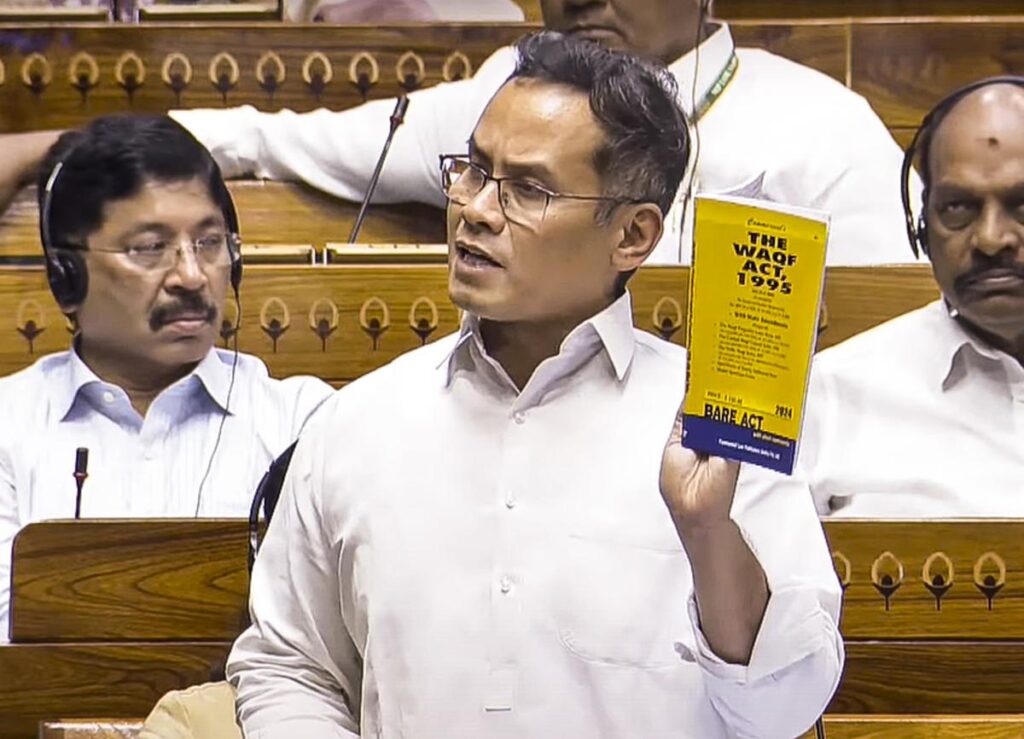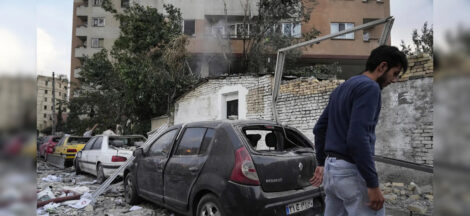By Krishna Jha
“Who are you threatening? Waqf Act will be law, and all will have to obey,” declared home minister Amit Shah. It was almost prophetic, leaving no uncertainties. Autocracy was spreading its wings with brutal intolerance against any voices raised in opposition.
The initiative itself reflects not only a move towards diluting the Constitution, but also to defame and disenfranchise the minorities and thus divide the society itself, and accomplish the dream that the ruling party had been nurturing since long. In a bid to polarize the society further, the minority affairs minister said that claims of the drawbacks in the parent act are misleading. But in reality the Act itself has potential enough to release the floodgates of disagreements and disputes in the country. But that is not all.
The Act has also got anti-terror law (UAPA) in its provisions. Opposition also enquired whether UAPA would be exclusive for Waqf or other religious, charitable Acts and state boards. Concern has also been raised about clause three that has tried to define Muslims as those who had been practicing Islam for at least six years. The step amounts to question the very religious identity of Muslim minorities. It can be resolved only when the government certifies them so. Do they require any identification proof for being the citizens of this country? History itself is witness to it. The soil of this country has been soaked in their blood and bravery. In the first war of independence unleashed in 1857, they faced the firing squad fearlessly. It was Hasrat Mohani who had demanded complete independence in 1921, reiterated later by Indian National Congress in 1929 in Lahore as Poorna Swaraj during its session.
Today the Waqf (Amendment) Act is as an assault on the Constitution also. The language of the Act subtly reveals an ideological bias under the layers of neutrality. By emphasizing centralized control during historical “Muslim rule,” the Act justifies contemporary state overreach. Furthermore, it seeks to redefine Waqf from a faith-based community institution to a bureaucratic real estate system, facilitating the appropriation of religious spaces belonging to marginalized communities. The state’s demand for modern legal documentation ignores the centuries-old tradition of Waqf, to help those in need. It carries the heritage of Islamic Philanthropy, as a verse in Quran says, ”And in their wealth, the beggar and deprived had due share.”(XXXVI:19) Capitalism cannot accommodate such greatness and also openness since it is in direct contrast to it.
The Waqf (Amendment) Act violates the Constitution’s Article 25, which guarantees the Right to Freedom of Religion. There is a concern about the centralized digital database for Waqf properties as it may facilitate surveillance of Muslim institutions, with no equivalent system for other religious groups. This constitutes discriminatory digital disenfranchisement, especially in an environment of rising Islamophobia.
Furthermore, the Act infringes upon Article 26, which protects religious denominations’ right to manage their own affairs. The inclusion of non-Muslims on Waqf Boards and the transfer of responsibilities to district collectors are essentially the state overreach, allowing the government to redefine minority religious affairs. This violates the principle of state neutrality in religious matters, instead establishing the state as the arbiter of religious practice.
The Waqf (Amendment) Act is a tool for the systemic marginalization of Muslims, posing a significant threat to their personal laws and property rights. Traditionally, Waqf properties have been integral to Muslim community life in India, funding essential services like education, healthcare, and religious institutions. These properties represent more than mere assets; they embody collective autonomy and faith-based community care. The Act’s centralizing control, disregard for established customary usage, and emphasis on registration as the sole determinant of legality creates a framework for potential dispossession. Nearly all major Waqf Boards have voiced strong opposition to the Act’s proposal to expand the executive authority into religious matters. They specifically have criticized the removal of the “waqf by user” doctrine, which acknowledges properties dedicated to community welfare through continuous use, even without formal documentation.
The timing of this legislation, amidst concerns about the ideological neutrality of Indian bureaucracy, particularly in the context of demolitions targeting Muslim properties, raises further alarm. The bill reflects a shift from constitutional secularism to a regime of disenfranchisement and communal impoverishment, where minority communities are denied autonomy over their religious institutions. This is a form of land grab and the dispossessing of a community.
The Act has come at a time when India has been confronting a political project that seeks to promote Hindu authoritarianism by subjugating minorities. Muslims have been particularly targeted. The project is premised on the same old idea of RSS that India must be a Hindu Rashtra and minorities must subscribe to Hindu primacy—a position that threatens the very foundation of Indian democracy in which all citizens of every faith have equal standing.
The period since BJP first got absolute majority in the Lok Sabha in 2014 and Narendra Modi became the prime minister has witnessed massive efforts to steer the national discourse to treat Muslims as the ‘other’. Hate speeches, overt Islamophobia, lynchings and violent attacks on Muslims in the name of cow protection and ‘love jihad’ have become frequent. These as well as the BJP government’s efforts to push forward its Hindu majoritarian agenda, including a citizenship law seen to directly discriminate against Muslims, have started eroding and subjugating the secular, democratic vision of the Constitution.
For the first time since Independence, the Sangh’s objective of denying Muslims citizens’ rights is being lived out, from the legislature to the rhythms of their daily lives. Efforts of the RSS and the BJP to direct hate towards the minority community as a means of consolidating political power have marginalized and ghettoized Muslims on the ground. Its effects are vast, the terror it spreads enormous. (IPA Service)



 Congress Moves Forward With A Focussed Strategy At Ahmedabad Session
Congress Moves Forward With A Focussed Strategy At Ahmedabad Session 